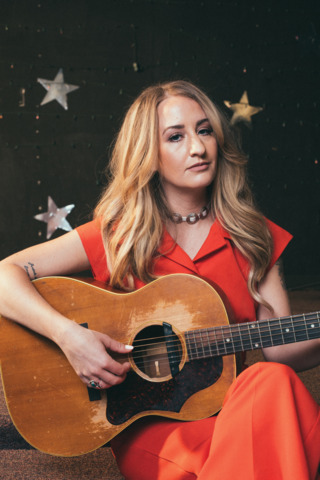
Country music is superb at addressing adult concerns — something we badly need right now
 Jason IsbellPhoto: Daniel Meigs
Jason IsbellPhoto: Daniel Meigs
Jason Isbell dominated the 18th Annual Country Music Critics Poll, topping the categories for Artist of the Year, Best Live Act, Best Songwriter and Best Album. That album, The Nashville Sound, takes its title from a line in the song “White Man’s World.” Over his band’s country-rock stomp, Isbell hollers, “Mama wants to change that Nashville sound / But they’re never gonna let her.”
The “mama” he’s referring to is presumably Amanda Shires — his fiddler, wife and the mother of his daughter — and “that Nashville sound” is country music, which as both an art form and a business has been centered in Tennessee’s capital since the 1940s. That desire for changing country music is shared by Papa Jason, and he seems to be changing it, whether they allow it or not.
Isbell has gotten the attention of the 94 critics voting in this year’s poll by the quality of his songwriting. But he’s gotten Music Row’s attention with his commercial clout — The Nashville Sound is Isbell’s second straight album to top Billboard’s Country Albums chart — and he’s done it without any support from mainstream country radio. In fact, Isbell is the first act in the 18 years of the Country Music Critics’ Poll to win the Artist of the Year category without ever having had a song on Billboard’s Hot Country Songs chart.
Chris Stapleton, winner of the Best Male Vocalist category and runner-up to Isbell in the Artist of the Year and Best Songwriter categories, has three straight No. 1 country albums to his credit (counting Vols. 1 and 2 of From A Room, which were released separately in 2017 as individual albums). Sturgill Simpson’s 2016 album A Sailor’s Guide to Earth also topped the country charts without much help from radio. Add it up, and it starts to look like a movement — a bandwagon that the mainstream country labels are trying to jump onto before they get run over.
As a result, major labels like Columbia Nashville, Big Machine and EMI Nashville are trying to sign their own Southern, shaggy, rough-around-the-edges storytelling singers in the image of Willie and Waylon: Luke Combs, Alex Williams, Midland, Brett Young, Brothers Osborne, Lukas Nelson, Brent Cobb. All these young men got votes in the Best New Act category, which was won by Midland, who also scored the No. 1 single with “Drinkin’ Problem.” Some of these artists are more likable than others, but none of them came up with a song anything like Isbell’s “If We Were Vampires,” which was the poll’s No. 3 single despite having hardly any radio play at all.
If a song titled “If We Were Vampires” had been written and recorded on today’s Music Row, it would have been a take-off on the Twilight movies — a romantic fantasy about staying in love forever, fuel for adolescent reverie. Isbell takes the exact opposite approach: He not only emphasizes the reality that we all die, but also celebrates the way our shortened lives force us to make the most of what little time we have. His understated vocal performance and melodrama-free arrangement make it clear that this is a song for adult sobriety.
“People want to live forever for the same reason they want a non-politician to be president,” Isbell told me when I interviewed him for Paste Magazine last year, “because they don’t know what that means. If we had a permanent time on the earth, we wouldn’t have the motivation to pursue anything. Time is a limited commodity, and if it weren’t, I’m not sure we would work up the courage to love anybody or to make art. If you have limitless time, you can always say, ‘I’ll say that tomorrow. I don’t need to do it today.’ ”
The song is a reminder that country music — like its sibling the blues — was once a music for adults. With its twangy, rural voices, its unplugged instrumentation and its stories of divorce, drink and death, country was uniquely qualified to address adult experiences that pop music sometimes tried to wish away. Let me be clear here: Adolescents have problems and concerns that are worthy of being addressed in music, and escapism has a function too. But that doesn’t mean every single song needs to cater to youths with a hunger for fantasy. There are artists in all genres capable of artfully and intelligently exploring serious issues. Country used to be a go-to genre for this, and it could be again.
It’s easy for the Music Row labels and country radio to accommodate acts with the scruffy look and scruffy sound of Isbell, Stapleton and Simpson. It’s not so easy for them to accommodate songs as death-shadowed as “If We Were Vampires,” as political as “White Man’s World” or as blunt about loss as Stapleton’s “Broken Halos,” the poll’s No. 4 best single.
Midland’s “Drinkin’ Problem,” for example, is as catchy an earworm as one might expect from a song co-written and produced by Music Row genius Shane McAnally. But its steel-guitar rootsiness owes more to Don Henley than to Gram Parsons or Robbie Robertson, and its lyrics are as lightweight as its breezy music might suggest.
Far more substantial is the debut album from Tyler Childers, the poll’s runner-up for Best New Act. Childers’ Purgatory, the poll’s No. 12 best album, was produced by Simpson. Childers’ drinking problems are not so easily shrugged off as Midland’s: He has no hope for heaven, but he’s betting that purgatory isn’t quite as hot as hell.
Men have been dominant in every area of country music for decades — that is, except among the critics. Prior to this year, women had been the poll’s Artist of the Year 12 times, as opposed to the five wins by men. On the other hand, good reviews don’t pay the rent, and the women trying to change that Nashville sound haven’t had the same sales as the men.
 Margo PricePhoto: Daniel Meigs
Margo PricePhoto: Daniel Meigs
Margo Price, who had the poll’s No. 2 best album, All American Made, made it only to No. 12 on Billboard’s Top Country Albums chart. Compare that to the No. 1s racked up by Isbell, Stapleton and Simpson. Lee Ann Womack’s The Lonely, the Lonesome and the Gone, the poll’s No. 3 best album, made it only to No. 37. Rhiannon Giddens’ Freedom Highway, the poll’s No. 5 best album, didn’t appear on the country charts at all (though it reached No. 8 on Billboard’s less significant Americana/Folk Albums chart). Angaleena Presley’s Wrangled, the poll’s No. 6 best album, didn’t appear on the country chart either.
Yet it was these women who delivered the year’s most pointed political songs. If ever a year called for a political response from American artists, it was 2017, when uncamouflaged racism and sexism was on wide display. While the Country Music Association was trying to gag reporters to prevent them from asking questions about politics at November’s awards show, women artists were asking their listeners the most pointed questions they could.
Price’s “Pay Gap” asked why women are still paid less than men for the same work. “We are all the same in the eyes of God,” Price sings over an Appalachian dobro and a Tejano accordion, “But in the eyes of rich white men / No more than a maid to be owned like a dog / A second-class citizen.” Giddens’ “Julie” dares us to forget the story of a slave who, as Union troops are closing in on the plantation house, informs her mistress that no, they’re not on the same side. Presley’s “Wrangled,” a Memphis soul number given a hillbilly arrangement, asks why a woman should “know her place” when she has her own place in mind, one better than anyone is going to give her in exchange for obedience.
The characters in these songs are not young women starting out in life. They’re adults halfway through a life of manual labor and harsh treatment. You can meet characters of similar age and experience in Sunny Sweeney’s “Bottle by My Bed,” the No. 11 best single, about a woman’s struggle to conceive; in Willie Nelson’s “God’s Problem Child,” written by Jamey Johnson and Tony Joe White; in Rodney Crowell’s “It Ain’t Over Yet,” the No. 7 best single, sung with Rosanne Cash and John Paul White; even in Little Big Town’s “Better Man,” the No. 9 best single, written by Taylor Swift, about a man who has failed his woman again and again.
And you can meet those characters in the poll’s No. 1 best reissue, At the Louisiana Hayride Tonight, the dazzling box-set bonanza of 20 CDs of live recordings from the legendary radio show in Shreveport, La. Here are riveting performances from Hank Williams, Webb Pierce, Rose Maddox, Johnny Cash, George Jones and Loretta Lynn, singing about adult problems for an adult audience.
Here’s hoping that Isbell, Stapleton, Price and Womack can re-create that art form for today’s adults. We need it.
This Article Was Originally Posted at www.einnews.com
http://www.einnews.com/article/428715827/UVeTSiwLx3pOLZmQ?ref=rss&ecode=N1bP1tH84JZ33sYs